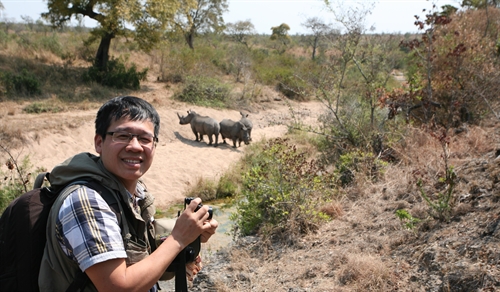 Life & Style
Life & Style

On the occasion of Việt Nam Journalism Day, June 21, Viêt Nam News talks to Đỗ Doãn Hoàng, one of the country’s most prolific investigative journalists.
 |
| Journalist Đỗ Doãn Hoàng. — Photo courtesy of Đỗ. |
On the occasion of Việt Nam Journalism Day, June 21, Viêt Nam News talks to Đỗ Doãn Hoàng, one of the country’s most prolific investigative journalists. During a nearly 20-year career, Hoàng was honoured four times with the National Press Prize for his investigative reporting.
Hoàng’s articles not only shed light on major social issues, including wildlife trafficking, illegal logging and sexual abuse of minors, but also contributed to changing social mindset and bringing about legislative revision in coping with such issues.
He was threatened and blackmailed many times while carrying out his duty as an investigative reporter. Earlier in March, Hoàng was assaulted by three unidentified men armed with wooden sticks while on duty in the vicinity of Hà Nội’s Hoàng Mai District, suffering numerous injuries including a broken finger.
Why did you choose investigative journalism in your career?
At the beginning of my career, I worked at various newspapers in town. There was this time when I was preparing to move my things from one office to another. I wanted to copy all of my published articles from my computer at work to a new hard drive.
As I was going over them one by one, I realised that I didn’t want to keep any of them because none were worth saving. Why? They did not produce any impact on society. I came to a realisation that my works as a journalist, therefore, did not bring about any positive changes. In other words, I was just wasting my youth.
That was when I decided to pursue investigative journalism. For me, the ultimate calling for reporters is to contribute to the betterment of society. Our articles must be able to help those who were forgotten, to sound the alarm bell on pressing issues and result in actual and positive changes in society.
Also, investigative journalism is challenging and certainly not an easy path. In order to pursue a career of investigative reporting, journalists must double their efforts and strive to better themselves everyday.
The incident in which you were brutally assaulted while on duty attracted a great deal of attention and raised concerns about safety for reporters. What would you like to share with readers regarding this incident?
In a country where dozens of people lose their lives in traffic every day, stories of journalists being threatened, blackmailed or even assaulted would probably not make newspapers’ front pages.
But I think we have a much bigger problem here than just a few attacks on some individuals. The issue at hand is how to protect honest and brave journalists, who risk so much to fight against corruption and other wrongdoings. As journalists, we fully comprehend the hazardous side of our profession but should we, as a society, fail to protect good, honest people, then naturally there will be less of them.
As a journalist, I felt obligated to speak out against such cowardice and violence. It was not just my personal safety. It was also the safety of nearly 20,000 of my colleagues across the country. Many of them are blackmailed, threatened, harassed and even assaulted every day just because they want to speak the truth.
I strongly believe that there is an urgent need to provide Vietnamese journalists with better protection to help them carry out their duties. At the very least, protection should be a priority in high-profile cases where threats to journalists are not just threats, but a real possibility.
As a veteran journalist in the field of investigative reporting, what would you like to share with young and aspiring Vietnamese journalists?
I want to remind them that journalism is a profession of great importance to society. The only standard for us, journalists, should be how our articles and our work contribute to a better community, a better society.
Young journalists must be fully aware of how their articles may affect the people around them. Unfortunately, it doesn’t always end on a happy note. Just like how good journalism may provide society with useful insights and help fuel positive movements, dishonest journalists may act to discourage and mislead the public from taking the right course of action.
Knowing their responsibility, young journalists must continue to better themselves, not only as journalists but also as members of society. Courage and personality must be nurtured every day to produce the strength needed to stay true to the pursuit of truth. — VNS




